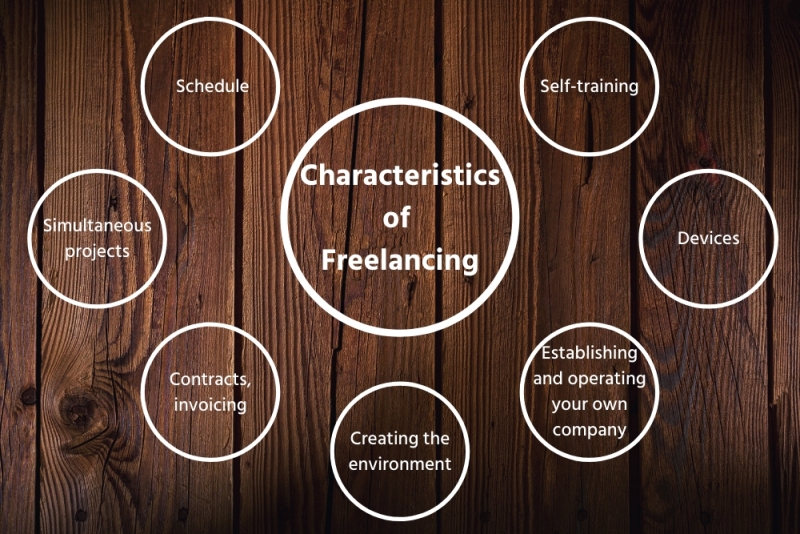What does it mean to be a freelancer? What makes being a freelancer different from being an employee? Learn more from the Bluebird article!
More...
What is Freelancing (or Who is a Freelancer)?
A Freelancer is an IT expert who is not an actual employee of a company but performs tasks on an individual project as an entrepreneur (as a self-employed person or as a company - Limited Company, Limited Partnership)
Typically, the length of a project is around 3-6-9 months. At the beginning, or following the project launch, the freelancer receives a request, performs the tasks, and moves on to the next project. That is how a classic IT freelancer works.
The Popularity of Freelance Projects
Mobility in the field of IT has been growing for years. Mainly because it is usually viewed as a combination of projects; as a result, the actual contracts are signed for a project or for the development of software products.
The other reason is that IT is in continuous development and change, the old static way of employment doesn’t suit the workers anymore.
We have asked thousands of IT experts yearly about their biggest motivations. The results are undisputed: professional challenge, interesting and new technologies, attractive wages. The answer is not that they would like to work with a huge brand. They would like to work with a good brand. They are not even looking for a stable job. In IT there is a permanent lack of workforce, and this will get worse with time. IT experts are not worried about not finding a job, but to work with interesting things is what matters most to them. Plus, wanting to get well-paid is obvious, besides other good reasons why top software engineers work freelance.

Covid19 and Remote Projects
In 2020 due to the pandemic, another great motivator has arisen: the home office. Remote projects were highly popular beforehand as well, but something happened in 2020. The experts who used to work in teams onsite realized that they could provide the same quality of work online, from home. This realization started a small avalanche and today many of the IT experts look exclusively for remote projects.
The IT experts realized that working for one given company could be a dead-end for their carrier. A great many developments last several years with the continuous upgrading of the given system. Software developers with a freelancer’s mindset have started to look for different projects, the kinds of jobs where they can work with interesting and new technologies.
In exchange, these IT experts had to renounce the cozy workplace environments, where progress is the project manager's responsibility and the development tasks can be performed in calmer and more static conditions.
Characteristics of Freelancing
Being a freelancer seems very attractive. Imagine you can work with the latest state-of-the-art technologies and tools…well, for an IT expert it is very good to hear. Continuously fresh solutions, continuous learning, acquiring new skills, sensible and speedy projects? That sounds really good. But what does a freelancer’s life look like in reality?

1. Self-Training
As a freelancer, you have to educate yourself all the time. No training wheels during your projects, you don’t know the environment, you don’t know the developers, testers, and operators who are working the project with you. You don’t even know where to get a coffee in the neighborhood.
To be able to perform your tasks correctly, you always have to be aware of the project stack, the main processes, and architectural questions, conventions, etc. For this, you have to study your new environment and be able to understand thoroughly where you ended up.
2. Devices
You will need to own the necessary devices yourself. I think that this will be the least of your problems, because a good laptop for developers is not very expensive, and also, on your computer, the settings are just the way you like them.
I also use my laptop until it dies completely because setting the configurations the way I like them takes several days.
3. Establishing and Operating Your Own Company
To be able to sign a contract, you will need a legal entity. Today, creating a company takes a day or two, but I would like to point out a few important things.
Creating the company is easy, but when it already exists there will always be something to take care of. Declaring your income, amortizing your assets, managing the bank account, invoicing, cross-checking with the accountant, etc.
I recommend this path only if you have the heart of an entrepreneur. With being a freelancer comes also the burden of managing your own company. Like it or not.
4. Creating the Environment
Creating a physical environment is essential for freelancers. In case of a remote project, you will need an office or a room where you can work uninterrupted on your project. After last years’ mandatory home office work due to the pandemic, most people realized that you cannot spend a day without your kid entering the room unexpectedly: « Come and play Daddy! » Furthermore, the time spent on projects by IT experts has skyrocketed because the interface (car, travel) between work and private life disappeared.
In case of a remote project the office has to be comfortable and well-equipped (internet, webcam, etc.) Regardless of it being a remote project, there is often a need for a consultation in person. In this case: Off you go, no matter what!
The same situation occurs when you can only perform your tasks onsite. Let’s just think about a complicated banking system or energy infrastructure. The companies are usually reluctant to give access to these kinds of systems to outsiders. Same thing with high-security projects.

5. Contracts, Invoicing
Naturally, a freelancer signs up for a project. The project has a starting point, an end (the deadline), a scope (tasks, precisely) and all this has a fee.
The freelancers’ job is to complete the tasks before the deadline. For completing the tasks, they receive a fee.
The fee is most often on an hourly or daily basis. The reason behind this: a fixed fee contract can only be signed between the parties if the scope of the project, the tasks to be performed are completely definite.
If the end product can be defined precisely, meaning that there is a detailed requirement specification, then a fixed price agreement is an option. Of course, the risks will resurface: Is there anyone else who can affect me delivering the product on time? What if the customer changes the requirements, etc.
IT is moving towards agility. Monolith requirement systems are not needed anymore, fast delivery units are (see DevOps). As well as flexible environments for development where everything happens to satisfy customers and end-users. As a result, the requirement for IT experts and suppliers is: be flexible, adapt to the newest needs, make a system that your customers love! It is not the contract you should wave around; but the results of the project.
It is supported mostly by a similarly loose way of invoicing. That is why hourly or daily fees are recommended.
6. Simultaneous Projects
As a freelancer, you will have the possibility to work on several projects at a time, for several customers. But only, if you have enough time and energy to completely understand several tasks at the same time, and in case you can spare enough time to complete them.
7. Schedule
In case of a remote project, your schedule is up to you. The requirements are: deliver the end product, the system documentation, a module, a microservice, or anything else.
There is a myriad of remote projects where the customer is not in the same time zone as the freelancer. As a result, it cannot be expected that your schedule fits your customer’s schedule. Most often there are no such requirements.
In case of an onsite project, you will still have your flexibility, but it could be influenced by factors such as: when will you reach others if you would like to check something? You will not have a fixed schedule either, but you will have to somewhat adapt to the project.
Summary
A freelancer’s life is for those who (as self-employed people) would like to work on projects where they can discover the latest technologies, who are ok with not having a fix salary(as opposed to regular employees), who are ready to execute their tasks defined in the contract on a very high level and who accept that they have to provide their own work environment (company, devices, office)
Being capable of working on several projects at the same time and collaborating with other IT experts in completing your tasks is just the cherry on the cake!
Welcome among IT entrepreneurs!



